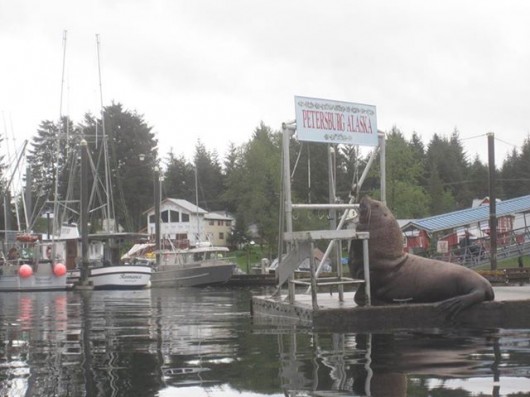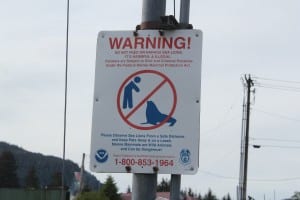
Brad Hunter took this photo of a large sea lion on a Petersburg harbor float. The borough wants federal officials to remove a problem sea lion from the area.
The National Marine Fisheries Service wants to wait and see if an aggressive sea lion in Petersburg’s harbors will move on, if fish scraps are no longer available. That’s the response this month to a request from Petersburg to remove the hungry animal.
Petersburg officials asked NMFS to remove a problem sea lion from Petersburg’s harbor following several incidents this spring and summer. Harbormaster Glorianne Wollen says the animal has acted aggressively around people cleaning fish.
“We just wanted the NMFS to realize that we have an overly aggressive animal in our harbor and we feel like we’ve done everything that we can within the law to try and combat the issue. And so we’re turning it back to them so that they realize this. We feel that NMFS has a responsibility to protect human life now,” she says.
The borough just passed a local ordinance which no longer allows people to discard fish scraps in the inner harbor waters and gutting and filleting fish is only allowed at designated cleaning stations. Federal authorities want to wait and see if this step and other possible measures will help.
NMFS fishery management officer Robert Mecum writes before NMFS can authorize, condone or undertake any action to remove an aggressive sea lion that has become accustomed to human sources of food, “(it) would need to see that all reasonable efforts have been taken to eliminate food sources for a sustained period of time.”
He adds, “It is likely that eliminating attractants entirely will result in the animal moving on which would solve the problem.”
Sadie Wright is a biologist with the NMFS protected resources division in Juneau. She says the problem has occurred in harbors throughout Alaska including Sitka, Seward, Kodiak and Gustavus, but can be solved.
“If there’s no food for sea lions in the harbor and there’s no good place for them to rest and earn an easy meal then they’ll leave. They’ll go to a more natural setting and go find food on their own,” Wright says.
“It might take some time and Petersburg I think is taking some good steps in the right direction to remove the attractant and make the harbor less comfortable for sea lions to be in.”
The Aug. 8 letter from Mecum suggests fencing off a state-owned sea plane float and cleaning off the sea lion scent from that float. It’s a convenient and popular haulout for the animals, not far from the fish cleaning station in South Harbor. The agency’s Wright warns harbor users to be careful with their catch.
“Well it sounds like there was an incident recently where people laid out halibut on the dock so that they could be measured for sampling and a sea lion jumped up and grabbed one of the halibut. So they are smart and they’ll find the quick meal, the easy meal,” Wright says.
“So I think something to keep in mind is to get your fish from your boat up to a terrestrial setting, up to land, as quickly as possible, so that you’re not risking attracting these sea lions to you boat or to the dock,” Wright says.
Sea lions are protected under federal law and listed as threatened under the endanger species act. The eastern part of the sea lion population, including those in Southeast Alaska, been proposed for delisting because of a growing numbers.
Harbormaster Wollen is frustrated with the NMFS response and urges people to use common sense in the harbors.
“And if there are any incidences please don’t let me hear about it the next day, or through third party, contact us immediately so we can get enforcement involved and we have numbers for people to call to kind of complain or to give their situation first hand,” Wollen says.
Attacks on harbor users have happened before, including one incident in Petersburg in 2007 when a sea lion bit a fishing boat crew member unloading a halibut.
Mayor Mark Jensen responded to the NMFS letter Friday calling it unfortunate that the agency is unwilling to take an active role and remove the threatening animal. Jensen writes that the Petersburg Borough believes the federal agency will be liable for property damage or injury and wants residents and visitors to take their concerns to NMFS.












